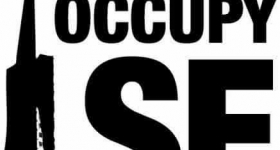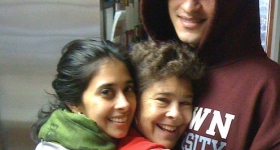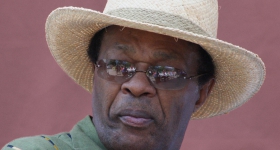THE YEAR 2008 will go down in history as the year in which minorities claimed a space on the national stage, finally shedding burden and stigma to compete in this country's ultimate popularity contest: the race for president.
Minority candidates burst into the race for the Democratic nomination like dormant bazooka rounds: Sen. Barack Obama, the out-of-nowhere, incredibly popular orator and first viable black candidate for president; Sen. Hillary Clinton, tough and strong, the first viable woman; New Mexico Gov. Bill Richardson, experienced and calm, the first Latino. One by one, the old white men and then young white men dropped from the race, and for the first time, election coverage became consumed with minority candidates and minority voters.
Would Latinos make the final difference in Texas? Would blacks give Obama the South? Would women stick with Clinton or be wooed by Obama?
After years of identity politics, discrimination and hate, a warming pride spread over the nation. There was a sense that though sexism and racism still reign, they don't reign unabridged-a sense that America could someday overcome its sordid past.
After the initial glow passed, and it took a while, some of us were left feeling a little unsettled, notably, Asian Americans.
In all the grand, sweeping, historical changes, we watched from the sidelines. Sure, some campaigns have Asian American staff members and some rich Asian Americans donate money. But no one was talking to or about us. No Asian American politicians were invited to the minority debates in Nevada. The media rarely even uttered the phrase "the Asian American vote."
Many Asian Americans felt ignored-and maybe a little sheepish. After all, it's our supposed disdain for politics that's kept us out of power. The truth is there's a reason Asian Americans didn't make this year's presidential candidate roster. First, we're an incredibly diverse population. OK, so are Latinos, but at least they share a language. And we have the smallest population of the minority groups. But more than any other factor, it's our newness that sets us apart. For Asian Americans, political history is recent. We were the last to arrive, the last to become citizens, the last, effectively, to get the right to vote.
But we do have a growing number of politicians in our midst.
In Cupertino, a suburb of San Jose, CA, the Asian American population increased nine-fold from 1980 through 2000 to 44 percent of the city. Half of the city council is Asian American, including the mayor, a Taiwanese immigrant. In Sunnyvale, another San Jose suburb, the top official is a native of Hong Kong.
"As these suburbs change and shift, you're seeing people run for office," says James Lai, co-editor of the National Asian Pacific American Political Almanac and an assistant professor of political Science and ethnic studies at Santa Clara University. "We've got to sustain this over time, build on that. The key is to keep filling these slots as they come open."
In Cupertino, two more Asian Americans are on the ballot for citywide office in 2008.
"It takes time for a community to settle in, to take care of their needs like food, shelter, education," Lai says, "after that's settled, they can start to think of political involvement." Asians only achieved full legal equality 40 years ago and, "considering the short time, we've made remarkable progress."
This newness not only makes political participation less of a priority, but also can make voters wary of Asian American candidates. For some voters, it's as if an Asian American candidate's national loyalties are suspect, even if that candidate was born and raised in the United States.
But now, more and more Asian American elected officials who are naturalized citizens, immigrants from Saigon, Hong Kong or Delhi. Swati Dandekar in Iowa, Van Tran in California, Hubert Vo in Texas, Elaine Chao, the current US secretary of Labor-are all firstgeneration individuals who have risen to political prominence.
Lai has seen more and more students of Asian American studies take to politics after graduation. "They're becoming awakened," he says, "they see the need to enter politics, whereas before it would have been engineering."
A number of factors are turning in our favor: the growing importance of the Western states-where Asian Americans are concentrated-in politics, high rates of intermarriage make us racially friendlier than our minority counterparts, we've got money and our youth are forging a collective identity.
So when will this Asian American political energy beam itself into the White House? Hyphen has a few ideas. For you betting types, here are our picks:
1 LOUISIANA GOV. BOBBY JINDAL
His youth, his insatiable ambition and his pronounceable name are all factors that influenced our top pick-the recently sworn-in, first-term Republican Wunderkind governor of Louisiana. The son of South Asian immigrants, Jindal is Southern drawl with an Asian-nerd resume: summer intern for powerful US Representative Jim McCrery while an undergrad at Brown University, Rhodes Scholar, Louisiana secretary of Health Care at age 24, director of a national commission on Medicare at age 26, president of the University of Louisiana system at age 27, US Assistant secretary of Health and Human Services at age 29, US Congressman and president of freshman House Republican class, age 32. And now, governor of Louisiana, age 36. It seems impossible that Jindal doesn't have presidential aspirations.
"I'm sure he thinks of himself as a contender" says Kevin Mulcahy, professor of political science at Louisiana State University. Considering the OOP's lack of minorities and the large amount of party money poured into Jindal's gubernatorial bid, he says, "I'm sure there are a lot of people in the Republican party who see him the same way."
A convert to Catholicism, Jindal made headlines for his extreme social conservatism (he's against abortion, even in cases of incest, rape or mortal threat to the mother), but in Louisiana, he's par for the course. "Social issues are non-issues in Louisiana politics," Mulcahy says, "abortion, gay marriage, forget it." But Jindal's not pandering to his state either. "He believes it," Mulcahy says, "this guy is as moral as the day is long."
On the flipside, his current job may well put an end to Jindal's accelerated trajectory of success. Despite his rabid social conservatism, Jindal is not a Louisiana-style politician, nor are his cadre of young, ambitious staff members, according to Mulcahy. Louisiana governors are kings-ruthless political operators who strong-arm the legislature and preside benevolently over a generous state budget. The wonkish, young Jindal's pledge to turn Louisiana from its corrupt heritage to a squeaky clean, tax-and-budget cutting model of efficiency may appeal to Republicans elsewhere in the nation, but may do him little good in a troubled state with an impoverished, uneducated constituency that depends heavily on government hand-outs. Louisiana is not kind to its reform-minded governors. In fact, none has ever served a second term. Jindal likes to switch jobs often, which might inspire him to bail and accept an offer of vice presidential candidacy or a White House cabinet post. But if he wants to be the first Asian American president, let him try for re-election in four years. If he succeeds in helping out Louisiana and pulls off a second win, he'll be first in line for a fried Mars Bar at the Iowa State Fair come 2015.
2-5 THE CALIFORNIA CREW
Despite their differences, if any one of these Californians runs for governor or lieutenant governor when Gov. Arnold Schwarzenegger's termed out, they'll instantly rise to our No. 2 pick. California is arguably the most important state for Asian American politicians at the moment. On the Pacific Coast, to a degree not seen anywhere else, Asian American politicians are reaching critical mass-there are enough of them so that one or more of them should naturally compete for higher level offices. Since the state's US Senate seats are unavailable, we'll turn to the soon-to-be-vacant governorship, a historically successful launching pad for the presidency. None of these politicians could run for president from their current positions (you can't jump from the House or cabinet to the White House unless you're a household name like Nancy Pelosi, Newt Gingrich, Colin Powell, or Condoleeza Rice)-but all of them are positioned to run for governor.
2 US REPRESENTATIVE MIKE HONDA
Couple the awesome financial power of Silicon Valley with powerful party connections and a humble life story, and you have San Jose's 15th congressional district representative. A onetime teacher and school principal, Honda has served in the House since 2001, after moving up through the ranks of local office. In 2005, he became vice chairman of the National Democratic Committee, second fiddle to Howard Dean. He's also chair of the House's Asian American Caucus.
3 ASSEMBLYMAN ALBERTO TORRICO
A man Lai describes as "a fast riser and big mover," Torrico reached the state legislature, and the high-powered title of assistant majority whip, after serving three years on Newark's city council. Torrico is known around the state as a superb fundraiser, not only for himself, but also for other Asian American candidates. When a Democrat, regardless of Asian-ness, is considering a run, often they'll check with Torrico first. Consequently, he has a lot of friends among his political cohort. Moreover, with a Japanese mom and Bolivian dad, Torrico has a leg up on that coveted Latino vote. On the downside, Torrico has said he's not interested in higher office. (But then, don't they all?)
4 STATE CONTROLLER JOHN CHIANG
It's hard to say why, but California's controller is a household name. You wouldn't think that leadership of the state's Equalization Board, which collects taxes, would be a popularity contest, but people in the state all seem to know and like Chiang. In fact, an unscientific poll, conducted in the presence of whiskey, indicates that Chiang is the only Asian American politician most people have heard of. He's also worked for deposed Gov. Gray Davis and US Sen. Barbara Boxer and, unlike the others in this category, Chiang has already won a statewide election. Keep an eye on his colleague on the Board of Equalization (which for some reason is totally Asian-dominated), Michelle Parks-Steele, to also rise in the ranks.
5 FORMER ASSEMBLYWOMAN WILMA CHAN
A Democrat from Oakland, Chan held various powerful leadership positions during her six years in the state Assembly. Now, after a stint teaching at the University of California, Berkeley, she's running for state Senate. Well-known for her work on education, health-care, and eliminating toxins from household items, Chan will be one to watch if she wins the state Senate seat, and particularly if she makes a move for governor.
6 FORMER WASHINGTON GOVERNOR GARY LOCKE
Locke-lovers cite three things-former two-term governor's political centrism, probable backing by the coffers of Microsoft, and his hot wife-as proof of his national potential. In 2003, the Democrats chose him to deliver the party's response to President Bush's State of the Union Address, launching him into the national spotlight and feeding rumors that he might throw his hat into the ring for the 2008 presidential contest. Instead, he opted for a job at a Seattle lobbying firm specializing in foreign trade, telling reporters he wanted to "mow the lawn." Is he done with elected office for good? Is he accumulating a personal fortune to subsidize his eventual run? Doesn't he know that brush clearing and lawn mowing are billable hours when you're president? Who knows, the guy won't answer his phone and seems un-charmed by Hyphen's beguiling voicemail messages.
7-9 THE CRAPSHOOTS
These are the kids to watch-those who have the potential to work up through the ranks of local politics to land themselves on the ballot sometime in the 2020s and beyond. Moreover, each represents an area of growing power for the Asian American community: Maryland, Texas, and suburban California. If it's not one of these individuals, it'll be one of their peers.
7 MARYLAND ASSEMBLYMAN KUMAR BARVE
Barve is one of four delegates of South Asian heritage in Maryland's state legislature. He's also the Democratic Majority Leader. Is he interested in higher office? "We'll have to see," Barve says, "if the opportunity presents itself, I might be tempted to take it."
8 CAMPBELL, CA, CITY COUNCILMAN EVAN LOW
The San Francisco Bay Area is bursting with politicians of Japanese, Chinese, and Vietnamese heritage: mayors, city council members, planning commissioners and school board members. It's only a matter of time before one of these kids decides to have a go at higher office. Evan Low was 23 and the youngest person ever elected to the Campbell City Council in 2006. Plus, he's gay. Evan for president, 2032!
9 FORMER HOUSTON CITY COUNCILMAN GORDON QUAN
OK, the mayor's named Bill White, but don't let that fool you. Asian Americans run rampant in Houston's political circles. Vietnamese immigrant Hubert Vo represents southwest Houston in the Texas House of Representatives, Council member MJ. Khan covers the same area on Houston's city council. Martha Wong represented Houston's central neighborhoods in the state legislature for two terms, after serving for years on the city council. One of these days, a big Asian American politician is going to come out of Houston. Immigration attorney and former city council member Gordon Quan is our pick.
Rina Palta is a freelance journalist living in San Francisco.
San Francisco-based writer RINA PALTA was surprised by three things while reporting on the possibility of an Asian American president: "One, the growing number of Asian American politicians who are immigrants-I had no idea so many were achieving such immediate political success. Two, a lot of Asians live in Texas. Three, Gary Locke has a listed number." Palta has written for Mother Jones, the American Prospect, SF Weekly, Tufts Magazine and the Oakland Tribune.









Comments